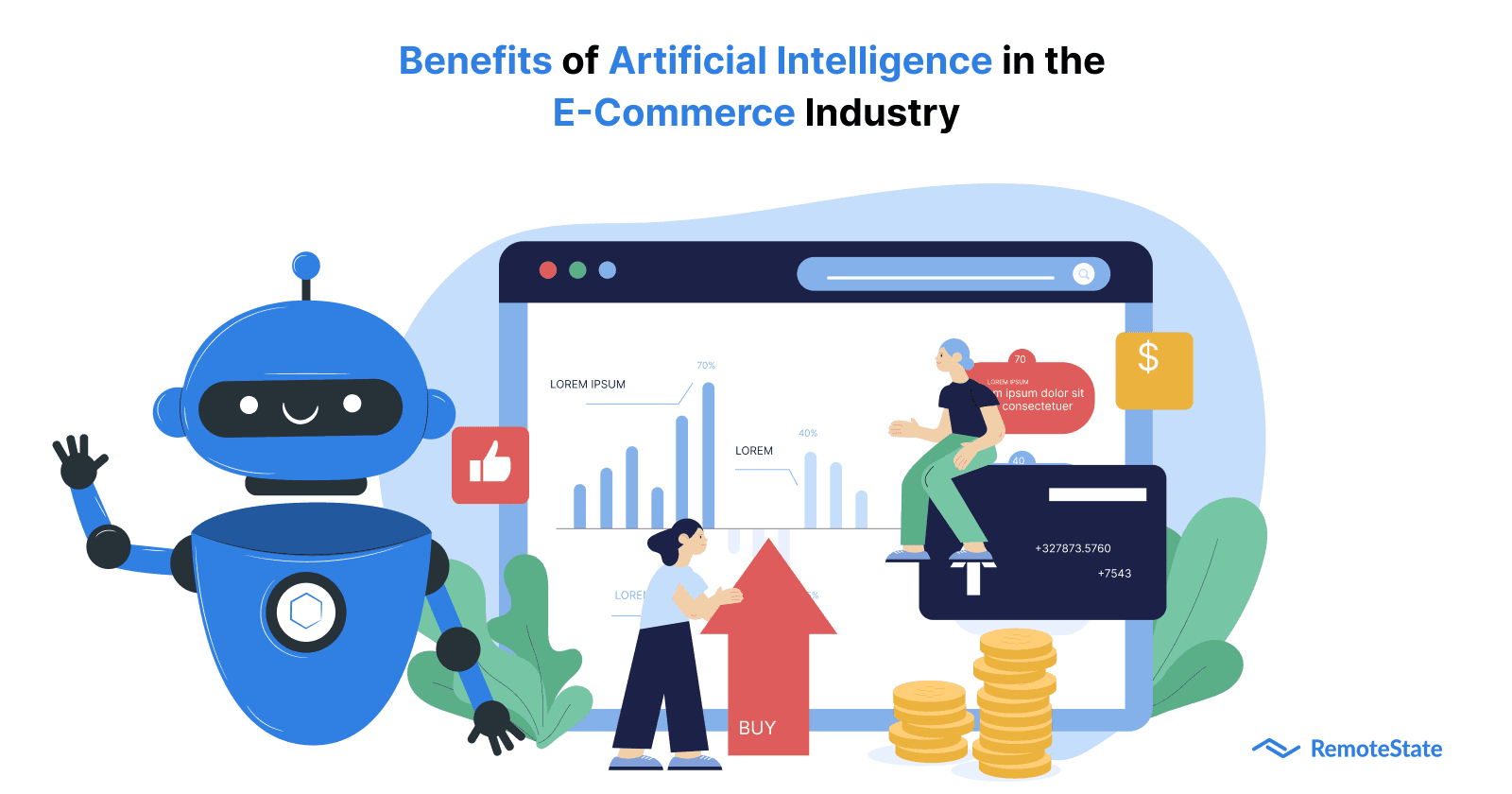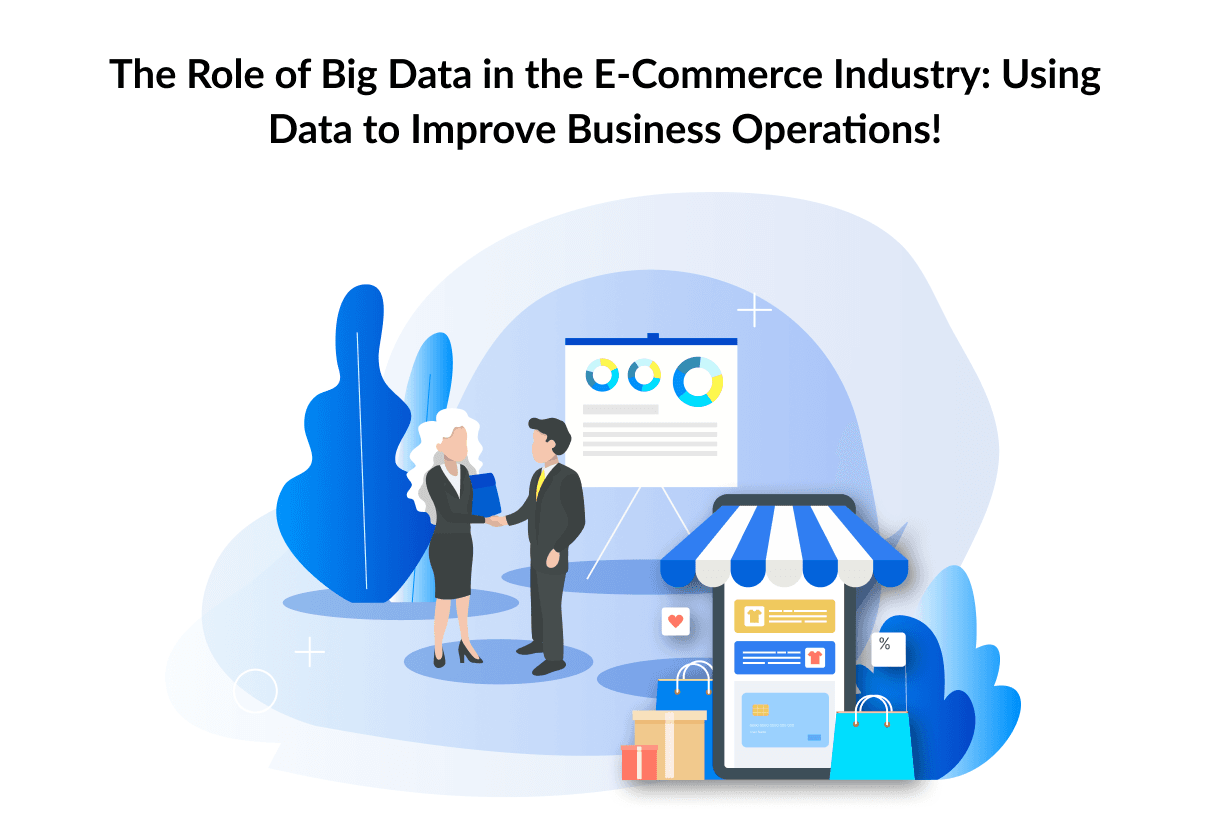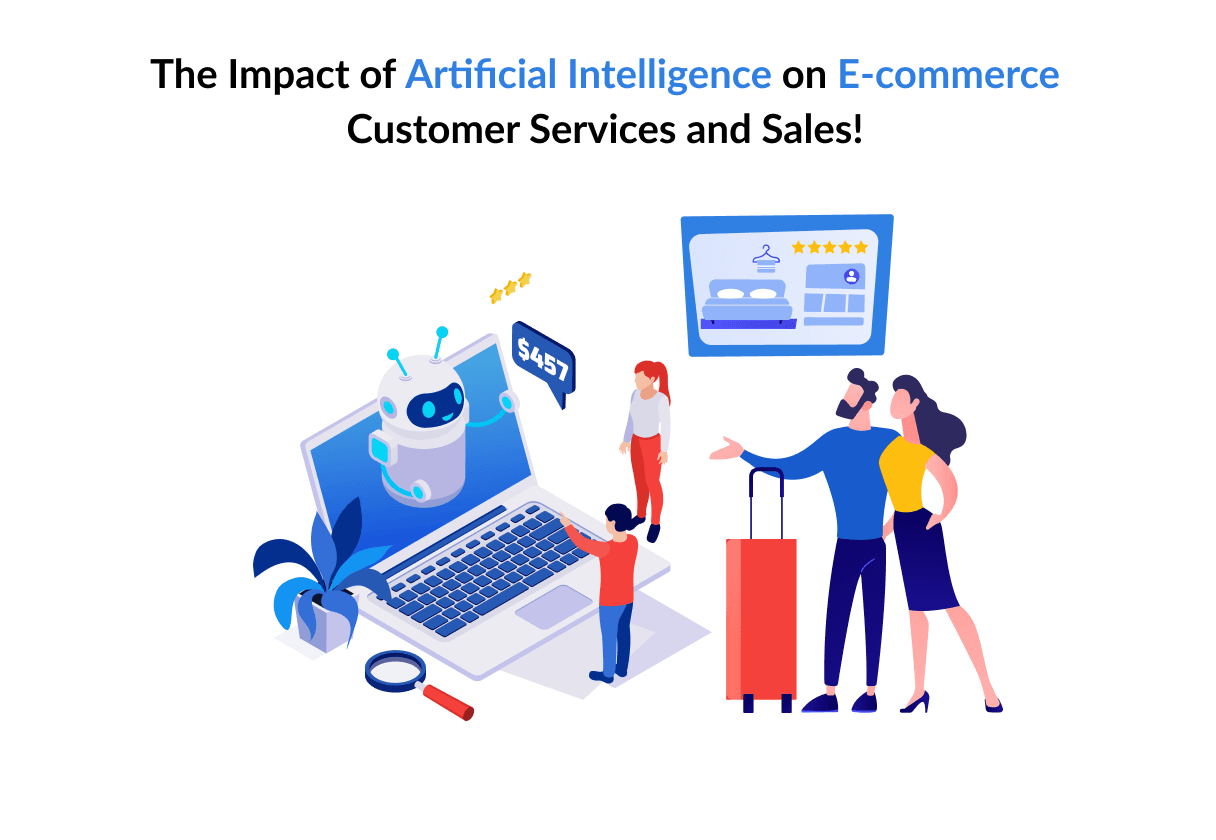Introduction
Artificial intelligence (AI) has been a game changer in many industries, and the e-commerce industry is no exception. With the rise of online shopping, e-commerce businesses are turning to AI to help them keep up with the demands of their customers.
Artificial intelligence (AI) has been a game changer in many industries, and the e-commerce industry is no exception. With the rise of online shopping, e-commerce businesses are turning to AI to help them keep up with the demands of their customers.
In this blog, we will explore how AI is revolutionizing the e-commerce industry and the benefits, challenges, and opportunities that come with it.
Benefits of AI in the E-Commerce Industry

Personalization
One of the biggest benefits of AI in e-commerce is the ability to offer personalized experiences to customers. AI algorithms can analyze customer data to create personalized recommendations, product suggestions, and even pricing. This personalization can increase customer loyalty and drive sales. By analyzing past purchases, searches, and behaviors, AI can recommend products that are likely to interest each customer.
For example, Amazon's recommendation engine uses AI to suggest products based on a customer's browsing history and purchase patterns. By offering personalized experiences, e-commerce businesses can create loyal customers who are more likely to return for future purchases.
Improved Customer Service
AI-powered chatbots can handle customer inquiries and issues in real time, 24/7. This not only provides convenience to customers but also reduces the workload for customer service agents. Additionally, AI can analyze customer interactions to identify patterns and improve the customer experience.
For example, chatbots can answer frequently asked questions, such as shipping information or return policies, freeing up customer service agents to handle more complex issues. Chatbots can also identify when a customer is dissatisfied with their experience and escalate the issue to a human representative. This allows businesses to provide faster and more efficient customer service.
Inventory Management
AI can optimize inventory management by predicting demand and suggesting restocking schedules. This can prevent stockouts and overstocking, which can both negative impact revenue. By analyzing sales data and other factors such as seasonality, promotions, and pricing, AI algorithms can predict future demand and suggest when to restock items.
This allows businesses to better manage their inventory levels and reduce the risk of stockouts or overstocking, which can result in lost sales and wasted resources.
Fraud Detection
AI algorithms can identify fraudulent transactions by analyzing patterns and behaviors. This can prevent revenue loss and protect customers from fraud. By analyzing purchase history, location, and other factors, AI can flag suspicious transactions and alert businesses to potential fraud. This allows businesses to take action quickly and prevent further fraudulent activity.
Supply Chain Management
AI can optimize supply chain management by identifying inefficiencies and suggesting improvements. This can improve product availability and reduce costs. By analyzing data on shipping times, delivery costs, and supplier performance, AI can identify areas where the supply chain can be optimized. For example, AI algorithms can suggest alternative suppliers that offer better prices or faster delivery times. This can improve the overall efficiency of the supply chain and reduce costs.
Challenges of AI in the E-Commerce Industry
Data Quality
AI algorithms rely heavily on data to make accurate predictions and recommendations. Poor data quality can lead to inaccurate results and impact the customer experience. E-commerce businesses need to ensure they have clean and accurate data to maximize the benefits of AI. This includes regularly updating customer data and ensuring that data is entered correctly. Businesses should also regularly review data quality metrics and address any issues that arise.
Cost
AI implementation can be expensive, particularly for small businesses. E-commerce businesses need to carefully weigh the costs and benefits of AI before investing in it. Costs include purchasing AI software, hiring trained professionals, and ongoing maintenance and upgrades. While the benefits of AI can be significant, businesses need to ensure that the costs do not outweigh the benefits.
Training
AI algorithms need to be trained on high-quality data to be effective. This can be a time-consuming process that requires specialized skills. E-commerce businesses need to invest in training employees on how to collect and analyze data to ensure that the AI algorithms are properly trained.
Additionally, as AI technology advances, businesses need to ensure that their employees stay up to date on the latest developments and are trained on new AI technologies.
Privacy and Security
AI algorithms rely on large amounts of customer data, which can be sensitive. E-commerce businesses need to ensure that they are protecting their customers' privacy and data security. This includes implementing strong data protection policies, using encryption and other security measures, and regularly reviewing and updating security protocols.
Opportunities for AI in the E-Commerce Industry
Voice Commerce
The rise of smart speakers and virtual assistants has opened up new opportunities for e-commerce businesses to leverage AI. Voice commerce, or the ability to shop and make purchases using voice commands, is becoming increasingly popular. AI-powered virtual assistants, such as Amazon's Alexa and Google Assistant, can help customers make purchases, track packages, and receive personalized recommendations using voice commands.
E-commerce businesses that leverage voice commerce can improve the customer experience and increase sales.
Visual Search
Visual search allows customers to search for products using images rather than text. This is particularly useful for customers who are looking for a specific item but don't know the name or brand. AI-powered visual search technology can analyze images and provide accurate search results, increasing the likelihood of a purchase.
For example, Pinterest's Lens technology uses AI to analyze images and provide related products that users can purchase.
Predictive Analytics
Predictive analytics uses AI algorithms to predict customer behavior, such as purchase patterns and product preferences. E-commerce businesses can use this information to create targeted marketing campaigns and promotions, improving customer engagement and increasing sales.
For example, predictive analytics can be used to identify which customers are most likely to purchase a specific product, allowing businesses to target those customers with personalized promotions and recommendations.
How Remotestate can Help with AI Implementation in the E-Commerce Industry
Implementing AI in e-commerce can be a complex and daunting process, but with the right partner, businesses can successfully navigate the challenges and reap the benefits of this technology.
Remotestate can provide the necessary support and guidance to help businesses implement AI solutions that improve customer experiences and increase sales.
Remotestate's team of experts can work with businesses to understand their unique needs and develop customized AI solutions that address their specific challenges.
From developing personalized product recommendations to optimizing supply chain management, Remotestate can help businesses leverage the power of AI to improve their operations and grow their business.
Conclusion
AI is transforming the e-commerce industry, offering a range of benefits from personalization to fraud detection. However, businesses need to carefully weigh the costs and challenges of implementing AI to ensure that it is the right choice for their organization.
As AI technology advances, e-commerce businesses that leverage AI will be better positioned to provide a superior customer experience and increase sales.
FAQ's
What is AI in the E-Commerce Industry?
AI in e-commerce refers to the use of artificial intelligence technology to improve various aspects of online shopping, including personalization, inventory management, customer service, fraud detection, and supply chain management.
What are the benefits of AI in the E-Commerce Industry?
The benefits of AI in e-commerce include personalization, improved customer service, optimized inventory management, fraud detection, and supply chain management.
What are the opportunities for AI in the E-Commerce Industry?
The opportunities for AI in e-commerce include voice commerce, visual search, and predictive analytics.
Publication Date
2023-03-24
Category
E-Commerce
Author Name
Rahul Agrawal


